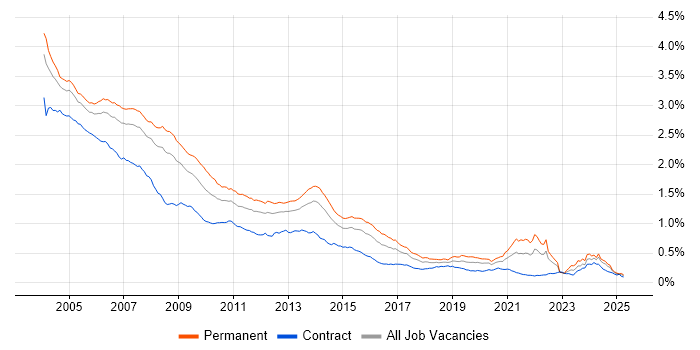Programmer
UK
The median Programmer salary in the UK is £40,000 per year, according to job vacancies posted during the 6 months leading to 4 May 2025.
The table below provides salary benchmarking and summary statistics, comparing them to the same period in the previous two years.
| 6 months to 4 May 2025 |
Same period 2024 | Same period 2023 | |
|---|---|---|---|
| Rank | 627 | 566 | 827 |
| Rank change year-on-year | -61 | +261 | -314 |
| Permanent jobs requiring a Programmer | 73 | 362 | 167 |
| As % of all permanent jobs advertised in the UK | 0.14% | 0.37% | 0.16% |
| As % of the Job Titles category | 0.15% | 0.39% | 0.18% |
| Number of salaries quoted | 38 | 267 | 111 |
| 10th Percentile | £30,000 | £30,000 | £38,750 |
| 25th Percentile | £35,250 | £35,000 | £47,500 |
| Median annual salary (50th Percentile) | £40,000 | £40,000 | £60,000 |
| Median % change year-on-year | - | -33.33% | +9.09% |
| 75th Percentile | £48,438 | £50,000 | £71,652 |
| 90th Percentile | £55,375 | £55,000 | £88,750 |
| UK excluding London median annual salary | £40,000 | £40,000 | £55,000 |
| % change year-on-year | - | -27.27% | +29.41% |
All Permanent IT Job Vacancies
UK
For comparison with the information above, the following table provides summary statistics for all permanent IT job vacancies. Most job vacancies include a discernible job title that can be normalized. As such, the figures in the second row provide an indication of the number of permanent jobs in our overall sample.
| Permanent vacancies in the UK with a recognized job title | 47,541 | 93,322 | 94,998 |
| % of permanent jobs with a recognized job title | 90.35% | 94.63% | 91.54% |
| Number of salaries quoted | 27,467 | 66,921 | 59,760 |
| 10th Percentile | £30,000 | £28,500 | £32,500 |
| 25th Percentile | £42,000 | £38,500 | £45,000 |
| Median annual salary (50th Percentile) | £57,500 | £52,550 | £60,000 |
| Median % change year-on-year | +9.42% | -12.42% | - |
| 75th Percentile | £75,000 | £71,250 | £81,250 |
| 90th Percentile | £97,500 | £90,000 | £100,000 |
| UK excluding London median annual salary | £52,000 | £50,000 | £53,000 |
| % change year-on-year | +4.00% | -5.66% | +6.00% |
Programmer
Job Vacancy Trend
Job postings that featured Programmer in the job title as a proportion of all IT jobs advertised.

Programmer
Salary Trend
3-month moving average salary quoted in jobs citing Programmer.
Programmer
Salary Histogram
Salary distribution for jobs citing Programmer over the 6 months to 4 May 2025.
Programmer
Top 17 Job Locations
The table below looks at the demand and provides a guide to the median salaries quoted in IT jobs citing Programmer within the UK over the 6 months to 4 May 2025. The 'Rank Change' column provides an indication of the change in demand within each location based on the same 6 month period last year.
| Location | Rank Change on Same Period Last Year |
Matching Permanent IT Job Ads |
Median Salary Past 6 Months |
Median Salary % Change on Same Period Last Year |
Live Jobs |
|---|---|---|---|---|---|
| UK excluding London | -33 | 64 | £40,000 | - | 129 |
| England | -103 | 56 | £40,000 | - | 147 |
| Work from Home | +145 | 17 | £52,500 | +31.25% | 83 |
| East of England | +3 | 13 | £44,000 | -2.22% | 14 |
| Midlands | -16 | 12 | £38,000 | - | 19 |
| North of England | +29 | 10 | £41,500 | +3.75% | 41 |
| South West | +76 | 9 | £37,000 | -12.94% | 20 |
| East Midlands | -2 | 9 | £40,000 | +5.26% | 8 |
| Northern Ireland | - | 8 | - | - | 1 |
| Yorkshire | +70 | 7 | £41,500 | +3.75% | 9 |
| South East | +38 | 7 | £43,750 | +9.38% | 27 |
| London | +77 | 5 | £40,000 | -23.81% | 29 |
| Scotland | - | 4 | £74,870 | - | 10 |
| West Midlands | +19 | 3 | £36,000 | -5.26% | 11 |
| North West | -11 | 2 | £35,000 | -30.00% | 29 |
| Wales | - | 1 | £28,000 | - | 2 |
| North East | - | 1 | £55,000 | - | 3 |
Programmer Skill Set
Top 30 Co-occurring Skills and Capabilities
For the 6 months to 4 May 2025, Programmer job roles required the following skills and capabilities in order of popularity. The figures indicate the absolute number co-occurrences and as a proportion of all permanent job ads featuring Programmer in the job title.
|
|
Programmer Skill Set
Co-occurring Skills and Capabilities by Category
The follow tables expand on the table above by listing co-occurrences grouped by category. The same employment type, locality and period is covered with up to 20 co-occurrences shown in each of the following categories:
